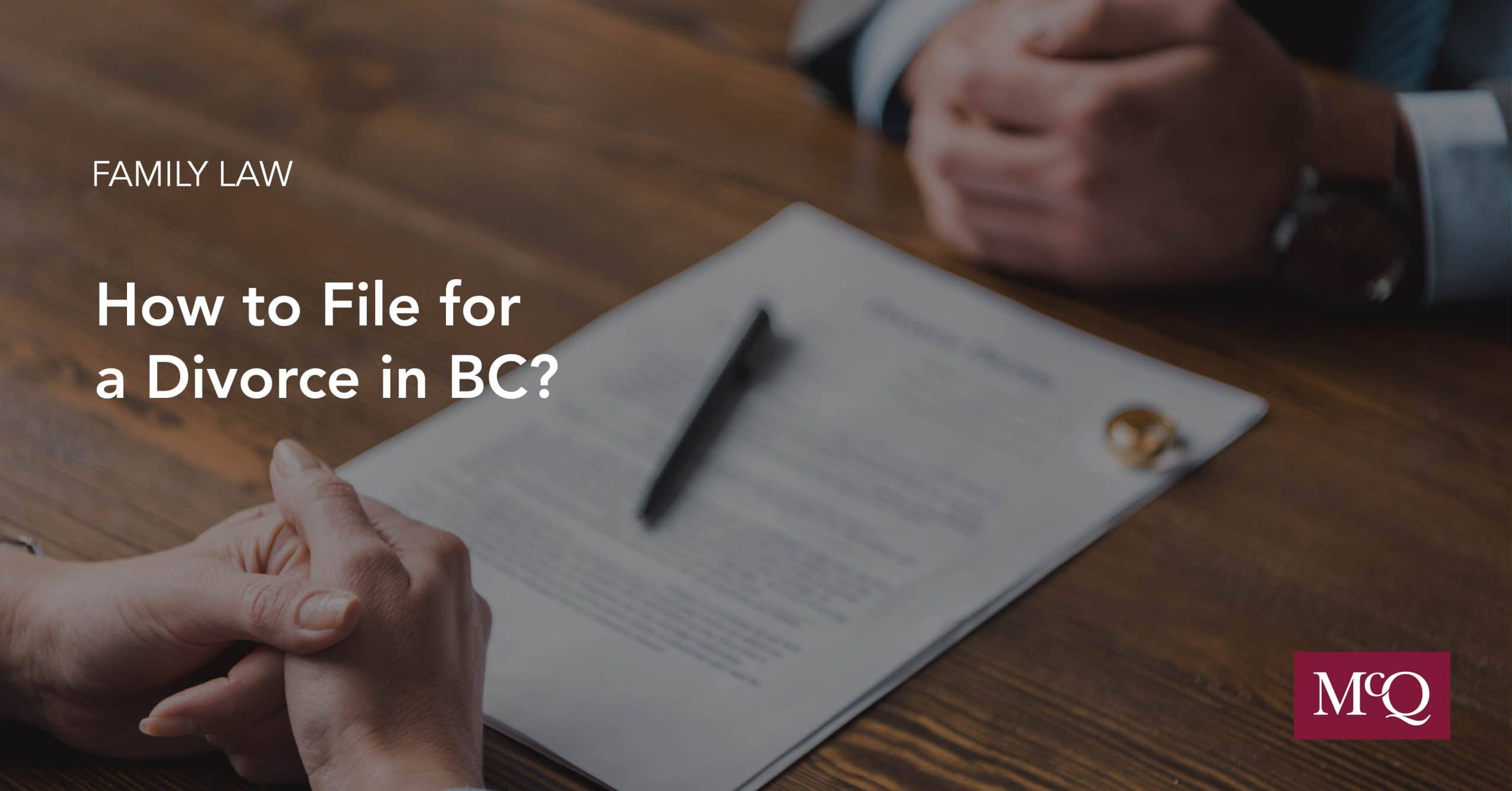Dispute Resolution & Litigation
Expropriation in British Columbia: Your Rights, Compensation, and Legal Options Explained
Share: April 7, 2025 | By Douglas J. Conolly 1. What…
Read moreIf you and your spouse are considering ending your marriage, you likely have many questions about divorce and how to get a divorce in BC. While an answer to many of your questions will likely vary depending on your specific situation, there are some common questions that come up during the separation process. To help you better understand what divorce is and how to file for one in BC, we answer some of the most frequently asked questions.

Separation and divorce are two separate processes. Separation occurs when you and your partner decide that your relationship has come to an end. There is no formal legal process involved in becoming separated from your spouse or partner. Instead, it merely consists of a decision made by one or both partners together to end the relationship. At this stage, it is important to consider negotiating a separation agreement with your former partner. A qualified family lawyer will be able to help you address property division and support obligation issues in a separation agreement.
Divorce, on the other hand, is a far more involved legal process. Only legally married couples can seek a divorce, meaning that common-law couples are neither required nor eligible to engage in the process. In the eyes of the law, their relationship is over once they have separated, and as soon as they address their property division and support issues, they can go their separate ways. However, it is essential to be aware that there is a two-year limitation period for common-law couples. Family Law Act s. 198(2) prohibits the separating couple from bringing claims related to property division or spousal support two years after their date of separation. As a result, common-law couples must take steps to resolve these issues promptly upon separating.
For a legally married couple to obtain a divorce, an application must be filed with the Supreme Court of British Columbia. If a separating couple has children, a divorce order will not be issued until the parties have arranged for appropriate child support to be paid.
In BC, there are two types of divorces: contested and uncontested. If the spouses mutually decide to end the marriage and agree on the terms of the divorce, they can file for an uncontested divorce. In an uncontested divorce, the couple resolves their child support, spousal support, property division, and child custody matters on their own. Uncontested divorces are usually a more straightforward and faster process as they do not involve court hearings.
However, if the spouses disagree on some issues in a divorce, they would pursue a contested (also known as a defended) divorce. For example, a couple may disagree about parenting, child custody or property separation issues. In this case, the court can order a divorce and a judge will decide on the issue at hand. This process can be far more complex, and it is important that you contact a Family lawyer to help you navigate the process of filing a contested divorce application.
You must meet several different requirements to be eligible to file for or obtain a divorce in BC. Firstly, you or your partner must have lived in British Columbia for at least one year prior to filing. In addition, there are three different “grounds for divorce” in British Columbia, which means that you must meet one of three criteria in order to be eligible to apply:
Importantly, while there are three different grounds for divorce in the province, the reality is that the separated for at least one year ground is used and applied the most frequently. If you have any questions about which of these grounds might apply best to you, do not hesitate to contact our office.
The unfortunate answer to this question is: it depends. For example, if you and your partner amicably resolve all issues and are prepared to file an uncontested divorce application, it can take approximately 3 to 6 months from the date of filing to receive your divorce order.
However, if a divorcing couple has property and support issues to resolve, the process can take longer. Depending on the complexity of the issues in your case, sometimes your lawyers will try to help you resolve property and support issues through negotiations, which can take anywhere from 6 months to 1.5 years. If they are unsuccessful, and a judge ends up having to make decisions about your divorce, the process can sometimes take much longer.
Our patient and compassionate Family Law team will help guide you during separation processes, court proceedings and negotiations. Contact McQuarrie today to book your consultation 604.581.7001
While the process might feel daunting at first, the knowledgeable and experienced Family Law team at McQuarrie is here to help. If you have any further questions about divorce and the filing process in BC, don’t hesitate to get in touch with our office, and we will be happy to assist you.

Dispute Resolution & Litigation
Share: April 7, 2025 | By Douglas J. Conolly 1. What…
Read moreDispute Resolution & Litigation
Share: April 3, 2025 | By Sunny Uppal Issue estoppel is…
Read moreDispute Resolution & Litigation
Share: March 19, 2025 | Represented By Sepideh Alimirzaee In a landmark…
Read more